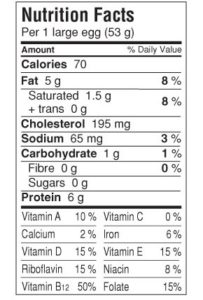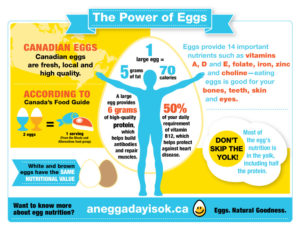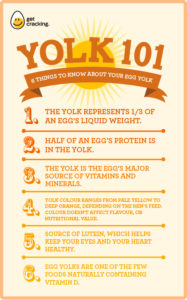Egg Nutrition

Egg Nutrition Facts
Eggs are one of nature’s most nutrient-dense foods. One large (53g) Grade-A egg contains 6g of protein and only 70 calories.
Protein
Eggs are one of the few foods considered to be a complete protein, because they contain all 9 essential amino acids. Amino acids are considered ‘building blocks for the body’ because they help form protein.
In addition to giving you energy, your body uses the protein found in eggs to:
- build and repair body tissues and cells
- build and maintain healthy muscles
- grow strong hair and nails
- help fight infections
- help keep your body fluids in balance
To maintain a healthy, balanced diet, Canada’s Food Guide recommends eating 1-3 servings of Meat and Alternatives every day, depending on age and gender. This includes a variety of protein sources, such as meat, poultry, fish, beans and eggs.
Nutrients
Eggs are not only an excellent source of high quality protein, but they also contain many vitamins and minerals:
| Nutrient | Benefit |
|---|---|
| Protein | Essential for building and repairing muscles, organs, skin, hair and other body tissues; needed to produce hormones, enzymes and antibodies; the protein in eggs is easily absorbed by the body |
| Iron | Carries oxygen to the cells; helps prevent anemia |
| Vitamin A | Helps maintain healthy skin and eye tissue; assists in night vision |
| Vitamin D | Strengthens bones and teeth; may help protect against certain cancers and auto-immune diseases |
| Vitamin E | An antioxidant that plays a role in maintaining good health and preventing disease |
| Vitamin B12 | Helps protect against heart disease |
| Folate | Helps produce and maintain new cells; helps prevent a type of anemia; helps protect against serious birth defects if taken prior to pregnancy and during the first three months of pregnancy |
| Selenium | Works with Vitamin E to act as an antioxidant to help prevent the breakdown of body tissues |
| Lutein & Zeaxanthin | Maintains good vision; may reduce the risk of age-related eye disease, such as cataracts and macular degeneration |
| Choline | Plays a strong role in brain development and function, this is especially true for babies over the age of 6 months |
Cholesterol
An egg a day is ok!
If you’ve been avoiding eggs because of concerns linking them to dietary cholesterol and coronary heart disease, it’s time to reconsider. The latest research shows that dietary cholesterol, like what’s in eggs, has very little effect on your blood cholesterol levels. Healthy adults can enjoy an egg every day without increasing their risk of heart disease.
According to the American Heart Association, lutein found in egg yolks also protects against the progress of early heart disease.
Omega-3
Omega-3s are a type of polyunsaturated fat, or healthy fat, known to protect your heart. They are essential for good health, but our bodies do not naturally produce them, which is why we have to eat them from foods such as salmon, certain types of oils and nuts, and Omega-3 eggs.
Omega-3 eggs are produced by feeding hens a diet containing flaxseed, a known source of Omega-3. Flaxseed naturally contains alpha-linolenic acid (ALA), a plant-based type of Omega-3 fatty acid.


